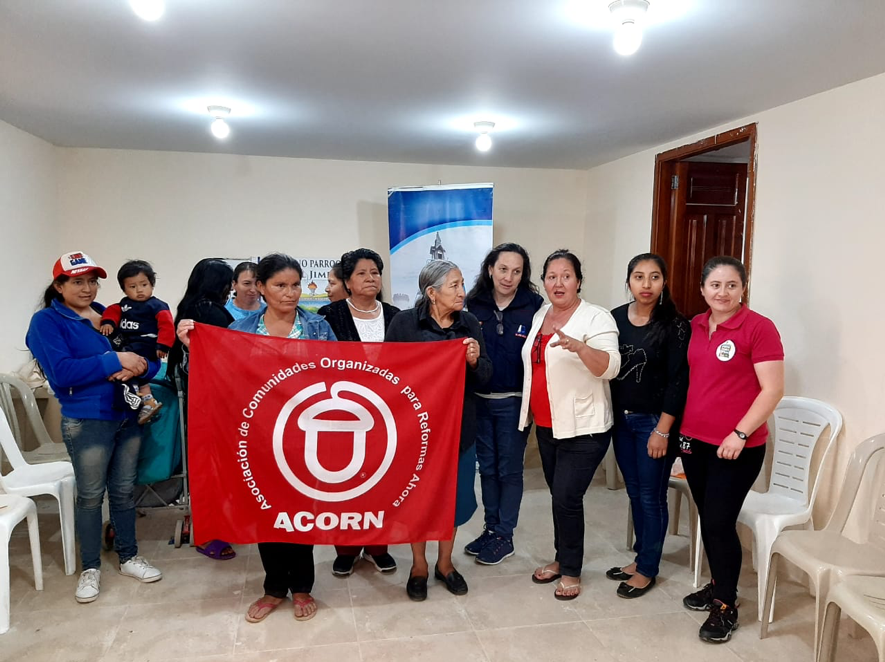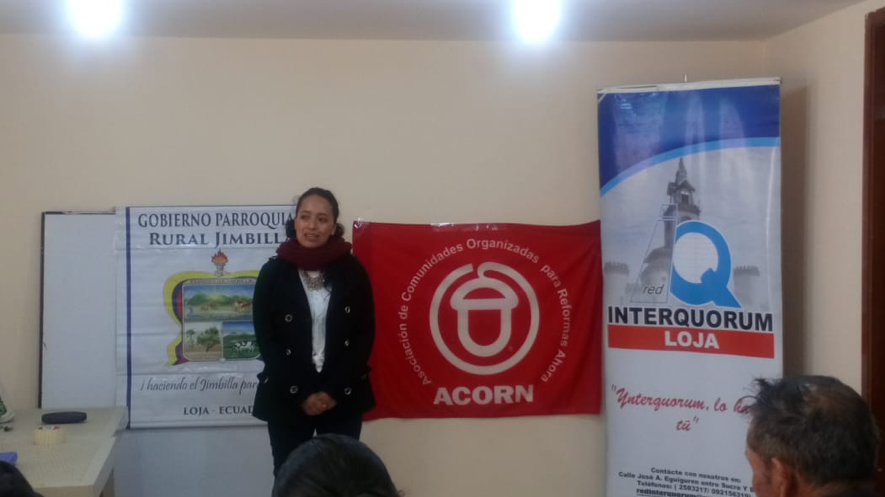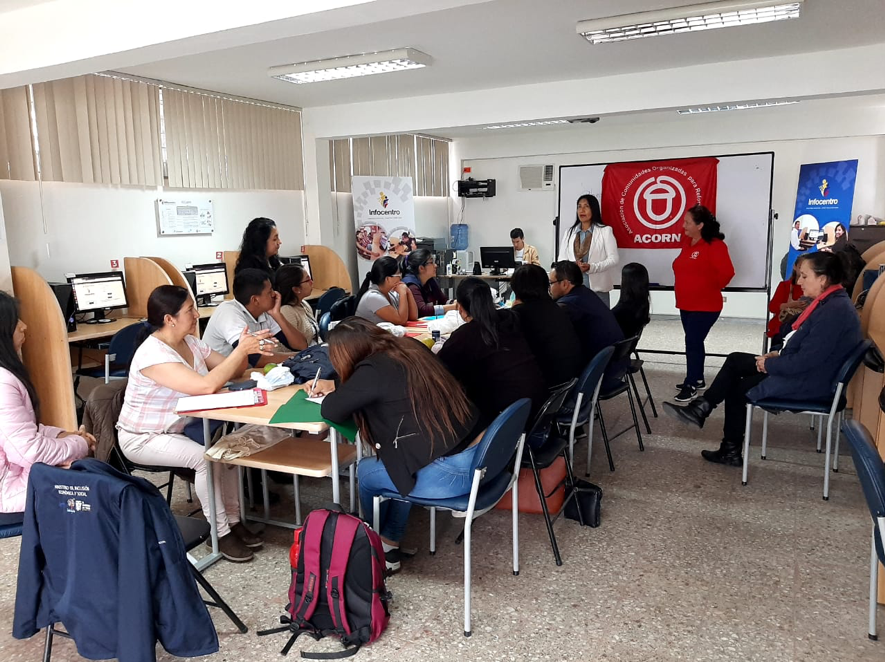Your cart is currently empty!
Blog
-

ACORN EN ECUADOR LOJA
ALIANZAS ESTRATEGICAS CON ORGANIZACIONES DE BASE Y LA COMUNIDADDE SAN JOSE Y EL CENTRO DE ACOGIMIENTO DOROTEA CARRION
-
ACORN EN ECUADOR LOJA
ALIANZAS ESTRATEGICAS CON ORGANIZACIONES DE BASE Y LA COMUNIDADDE SAN JOSE Y EL CENTRO DE ACOGIMIENTO DOROTEA CARRION
-
ACORN Around the World

Organizers’ Forum
El Comita, ACORN Tunisia and the Jasmine Foundation hosted the organizers forum in Tunis, Tunisia from September 12th to September 18th. The Organizers’ Forum annually visits different countries. In Tunisia, we met with unions, NGOs, environmental, and women’s organizations along with communities where ACORN’s affiliate, La Comita, was organizing. ACORN representatives induced Olivia O’Conner from Hamilton ACORN, Adrien Roux from the Alliance Citoyenne, Eloise Mallet from ReAct and ACORN Africa, Sammy Ndirangu from ACORN Kenya, and Marius Beloch from ACORN’s affiliate in Cameroon.
Cameroon
After months of campaigning, the threat of an action by the members of ACORN affiliate OnEstEnsemble led the agency to pay the hostesses of the GCG agency after waiting for months. The repair of the main pipe has been completed which will reconnect households to the network of water Bonewanda. Local residents have asked the Metropolitan regulate the parking of motorcycle taxis to avoid congestion.
Canada
At the national level, ACORN Canada released the report “Barriers to digital equality” which calls for affordable and universal access to the internet. In Toronto, ACORN members won the city vote for effective implementation of the RentSafe Toronto, a landlord registration program that we had won in 2016. In Mississauga, PEEL ACORN members won a proactive inspection program based on RentSafe Toronto which will be piloted in select buildings. In Ottawa, members won a motion at the city council to enact minimum distance and licensing requirements for payday lending companies. In Hamilton, members having fighting renovictions, the city voted unanimously in support of a motion to review the its incentive grant programs to developers to ensure no city funds are given to renovictors.
Czech Republic
Members of the social building cooperative and AKORN gathered on November 17 at the Republic Square to support the Real Left event called the Revealed Revolution. It was a call out for a comeback of the unfinished “velvet revolution” that began in November 1989, marking the establishment of the Civic Forum. Members are working to create a connected platform like the Civic Forum through which power can be shared and people are able to be actively engage and influence or propose programs.
France
ACORN’s affiliate in Lyon, France, Alliance Citoyenne represented its members in an action demanding burkini wearers be allowed to swim in public pools, wearing the ACORN visor hats! This comes in the wake of the proposed banning of the garment by the authorities in several French towns.
India
ACORN foundation in India demanded Indian companies to devise a method to buy back plastic packaging and bottles that get discarded by consumers after usage at a Bloomberg Equality Summit in Mumbai. ACORN India also featured in the award winning article in the Global Post.
Kenya
Members have been planning for the campaigns on Feeding program and that of Environmental sanitation in Korogocho and its neighboring villages. Members were able to strike a partnership with Koch FM which is the only radio station in Korogocho. This will allow ACORN to have four hours of daily programming with live or pre-recorded on air programs. Further, over 400 women attended an empowerment event in Korogocho in Nairobi, Kenya where six months’ supply of sanitary pads were distributed to all participants.
United Kingdom
In Brighton, as part of ACORN’s National Renters Vote campaign to mobilise people in vulnerable housing to vote in the General Election. Working across Brighton and Hove at soup kitchens, housing advice and community centres, street stalls and in temporary accommodation, the union has successfully registered almost 100 people, including 50 people with no fixed address. ACORN alongwith several allies launched a national renter manifesto which sets out the steps needed to ensure that everybody has a secure, affordable and decent home. The manifesto covers six key themes: Security, Affordability, Justice, Conditions, Discrimination, and Housing for People Not Profit.
ACORN Liverpool held a protest against homes being auctioned off in Kensington Fields. Members managed to get one of the homes pulled from today’s auction, but sadly the other one went ahead. Families with children in Liverpool are facing potential evictions as landlords advertise their homes to be sold off as student house shares. Acorn Liverpool’s AGM was a big when members spent time plotting and scheming to build working class power. A new committee is in place, and members are ready to get back at it.
ACORN started another new chapter for ACORN in England: ACORN Portsmouth!
United States
New Orleans: A Community Voice, ACORN’s Louisiana affiliate alongwith Justice and Beyond, a community group and other scientists and environmental activists were able to highlight the issue of lead poisoning and put forth demands for cleanup in New Orleans. While groups have been trying to call attention to the problem for years, it was only recently that a demonstration with some 50 people outside the water board headquarters to protest high water bills and lead levels brought attention to the issue. A 2016 study estimated that there are 6.1 million lead pipes bringing water to homes in the US, a fact that was hidden for long.
Memphis: Wade Rathke, founder of ACORN (Association of Community Organizations for Reform Now), and Diné Butler, community organizer and policy analyst, explored ways large equity firms are reducing homeownership in Memphis’ low-income neighborhoods.
Netherlands
Netherlands is pushing forward to build ACORN and more there. Inquiries about ACORN organizing have come from Tel Aviv where there’s interest in a building an ACORN Tenants’ Union. Marielle Benchehboune from Lyon is meeting with them in December when she is there for a conference. Progress is reportedly slow but steady for ACORN in Ireland as well.
-

ACORN at the Forefront of the Working Class
12 members and workers of our social building cooperative and civil association met at the Republic Square to support the event called the Revolution Betrayed held by the emergent student platform Real Left.

Equality, unity and fraternity somehow disappeared yet left with a taste for the unknown fruit of freedom, which we had managed to try.
We suffered bitterly from how worms wriggled, irritated the stomach juices and triggered a thunderstorm of pathological effects, but its taste, the taste of sweetness still lingers on the palate and reminds of what we were worth and what we would like to achieve.
Yes, the Velvet Revolution is considered to be an unfinished piece of hot iron, and we are holding wrenches and ringing them loudly! Velvet Revolution.

Execution on Property, Debts, The Unemployed, The Homeless and Dead Ideas.

Our solution is so far taking place primarily within the social cooperative and civic community association, but it can also grow to be political. We are both a social cooperative and a registered community association.
At the event “Revolution Betrayed”, we chanted: “Velvet is not over, so let’s pull it through!”

It is a slogan that certainly does not end with one demonstration or will not just repeat on the next November 17.
Czech ACORN members are considering how it can work throughout the year, prospectively until next November.
-Why not launch our own year-round campaign “Completing the Velvet” or some such?

In 1989, the Civic Forum was founded. CF was supposed not only to mediate between citizens and executive bodies of the state, but to strengthen the thesis that democracy is a space for equal opportunities to offer various solutions, concepts and principles.
Public policies should engage in the form of competition, but it does not always have to be rivalry in terms of being attracted to the trough or persuading crowds. We can imagine devising and social consensus and increasing efforts to cooperate.

Why do we propose the principle of political competition?
It is here to give citizens the opportunity to choose the agenda that convinces them most, which is the best.
Unfortunately, the very principle of today’s political competition forces the policies of particular political parties to sell their agenda at all costs as well as denigrating the agenda of other political parties. There is practically no way in which a politician would recognize or attempt to support the agenda of their political rival.

But democracy is here to stay
However, democracy is the principle for an independent platform through which citizens can propose legislation, administrative and executive decisions, engaging in social activism, as well as expressing their views on a variety of issues, such as local matters.
The Civic Forum originally stood a chance to become a platform, as a tool for citizens to exercise control in a transparent way.

Parliamentary democracy is good, but it has its shortcomings
Parliamentary democracy, except for all its advantages, to a number of parties means the incessant abstention from putting the proposed changes into practice. One government spends four years trying to implement their policies The opposition makes attempts to disrupt it, explaining to the citizens that this is the wrong direction. Four years later they want to come to power and the situation is reversed

That is also why we believe that a comprehensive platform of civil control and citizens’ direct influence on the legitimate and executive power would be a party principle. By offering people the means to exercise control, we simplify the way civil society works as it begins to function more directly and thus we create a more democratic environment for its full development.

Society is not built in such a way, but it barely survives !!!
Therefore, we staunchly support the implementation of the idea of an organization similar to the Civic Forum. For instance, a way of its instantiation could be establishing a organization that would be nonprofit in civic transparent hands and would force the current order to share power.
We think that creating a peaceful environment based on a friendly community can transform the whole political culture.

At first glance, small communities seem to be unable to change anything by themselves. Nonetheless, they work internally, for example, to provide social help, establish social cooperatives, and externally, they engage in tasks such as activism.
Small grassroots communities can form a common local organization. More local organizations can make up a common regional one, which, if united, can result in a nationwide network.
At first glance, it is a small scale drudgery, but at the same time, small communities keep emerging and some have recently joined together.
So in our view it is possible both to influence political culture and attain certain political goals.

A community does not automatically have to mean a political movement.
In a community, social work, counseling, say neighborhood assistance, is shaped, which can later grow to form cooperatives and become politically involved.
The betrayal of the CF was indeed a revolution betrayed.
CF initially assumed that there would naturally exist political parties and the notion of the party would work, but CF also counted on its own role. CF should be a community and politics should emerge at a grassroots level.
-

ACORN Czech Republic: We will complete the 1989 Revolution
Demonstration on November 17th anniversary.








We are a ready organization
At the beginning of its establishment ten years ago, the ACORN Association had constituted statutes ready to support a political parties wishing to set up platforms or non-profits alongside its own political activities that would offer citizens the opportunity to engage in their forums and assemblies either as individuals or entire groups with their goals.
According to the Articles of Association, it is possible to establish both a freadom members forum and a council of associated organizations with fixed settings or a council of organizations which belong directly to ACORN.
In doing so, we seek to extend the possibilities of party politics by involving citizens and, above all, bringing organizations and independent citizens together.
Our association has therefore decided to support some specific movements, to try to create a direct, united platform through which other engaged organizations or independent citizens can directly influence events and, using this principle, directly run or propose programs. Initiatives of free members, community associations, employees of social enterprises and so on can be involved.
Contact us on Messenger on the ACORN Czech facebook page and join the association or cooperative, we are recruiting all those interested in taking democratic measures to reach common consensus of all citizens!
-
Women’s Empowerment Event in Korogocho
Over 400 women attended an empowerment event in Korogocho in Nairobi, Kenya. A 6 month’s supply of sanitary pads were distributed to all participants.



-
ACORN India at the Bloomberg Equality Summit in Mumbai
Vinod Shetty talks about the Dharavi project & Dharavi Rocks performs.




Watch the Bloomberg Equality Summit in Mumbai here.
Video of Dharavi Rocks and Vinod below.






























